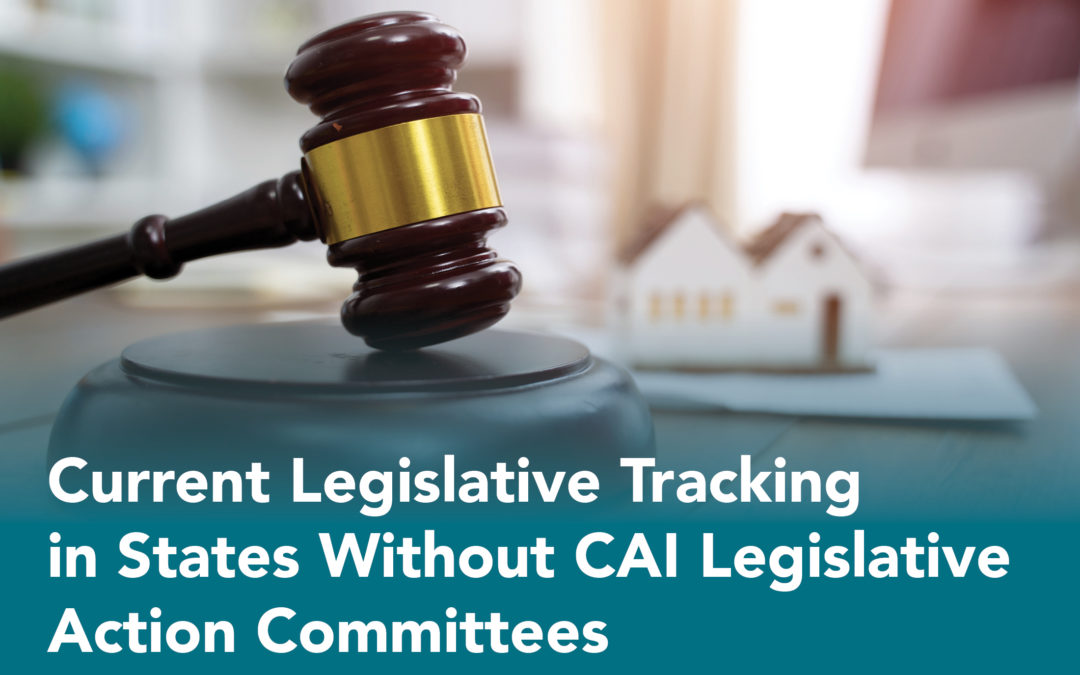Legislation impacting the community association housing model is introduced in all 50 U.S. state legislatures during each calendar year. CAI’s Government and Public Affairs team actively supports public policies that protect community association self-governance and promote civility through its network of state legislative action committees (LACs), as well as with volunteer advocates in states that do not have formally established LACs.
LACs monitor state legislation, educate lawmakers, and protect the interests of those living and working in community associations. Each committee includes homeowner leaders, community managers, and representatives from community association business partners who graciously volunteer their time. When a state does not have a LAC, the Government and Public Affairs team engages CAI members and other stakeholders in the state to connect with state legislators on issues impacting the community association housing model.
To date, CAI is actively advocating in five non-LAC states:
Alaska. While Alaska has a CAI chapter, there is no formally established LAC. We are working with attorneys and community manager members in the state to support SB 143 and HB 243, which pertains to mortgages, deeds of trust, and other property liens in horizontal property regimes and common interest communities. If enacted, this legislation will establish a streamlined method for community associations to obtain lienholder approval so that they may amend their governing documents and take advantage of the protections, flexibility, and guidance of the Uniform Common Interest Ownership Act (UCIOA), as well as the superpriority lien. This legislation aligns with CAI’s public policies on adoption of the Uniform Common Interest Ownership Act in addition to lien priority for community association assessments.
Iowa. We have engaged CAI’s grassroots network in Iowa to actively support HF 2005, pertaining to the regulation of home-based businesses by counties and cities. If enacted, the law will require use restrictions on home-based businesses that are reasonable and flexible and applied uniformly according to objective criteria for community associations in Iowa. This legislation aligns with CAI’s public policy on home-based businesses.
Louisiana. CAI is working with our members and stakeholders to oppose HB 9, a bill that limits a community association’s ability to provide for certain reasonable restrictions within their governing documents. CAI supports legislation that recognizes the core principle of self-governance and co-ownership of common property and the community association housing model.
Nebraska. CAI supports LB 1026 in Nebraska, a bill adopting the Unlawful Restrictive Covenant Modification Act. If enacted, this legislation will provide a simplified process for community associations, condominium communities, unit owners associations, residential housing cooperatives, and master associations to remove antiquated and unenforceable discriminatory restrictions contained in association covenants without a vote of the owners. This legislation aligns with CAI’s public policy on the amendment process for discriminatory restrictive covenants and incorporates a portion of CAI’s model legislative language on the issue.
West Virginia. CAI supports HB 4623, a bill pertaining to establishing requirements for holding virtual meetings and creating procedures for voting and proxy voting. CAI supports legislation that allows community association board and general membership meetings to be held virtually. This legislation would incorporate the newly adopted definition of “electronic” in the Uniform Common Interest Ownership Act approved by the Uniform Law Commission during its annual meeting in August 2021.
Learn more about 2022 state legislative trends impacting community associations and what’s happening in your state by viewing CAI’s Legislative and Public Policy tracking map.
If you reside or work in a state without a CAI chapter, we encourage you to join to build CAI’s network and benefit from CAI’s resources.



